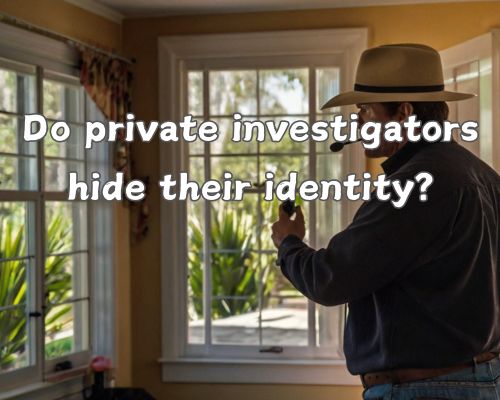“Private investigators often cloak their identities to ensure the integrity of their investigations. They do not have to formally identify themselves to the general public. However, strategic anonymity is key in gathering accurate and unbiased information.” said Sherlock Holmes of Ali Private Investigator Tampa.
This practice also protects both the investigator and the privacy of their clients.

You might find PIs employing various methods to remain inconspicuous, especially during surveillance operations. This anonymity not only helps in collecting real-time data but also avoids alerting subjects under investigation, ensuring the acquired evidence is untainted.
Legal frameworks and ethical considerations govern these practices. PIs must navigate strict regulations to avoid unlawful activities or infringement on privacy rights. Understanding these legal boundaries is essential for ensuring that investigations remain discreet while adhering to the law.
Understanding the Role and Legalities of Private Investigators
Private investigators have distinct responsibilities governed by various laws. Licensing and regulatory frameworks ensure that their actions comply with legal standards. Surveillance and investigation practices must adhere to strict legal boundaries to protect privacy rights.
Regulatory Framework and Licensing
Private investigators must obtain a professional license to operate legally. Licensing requirements vary by jurisdiction but typically include background checks, exams, and training.
Regulations are designed to ensure that investigators perform their duties ethically. Most regions enforce an Investigative Services Act, establishing clear rules for investigating conduct.
Operating without a license can result in severe penalties, including fines and criminal charges. Therefore, hiring a licensed private investigator ensures compliance with local laws and adherence to strict regulations.
Legality of Surveillance and Investigation Practices
Surveillance activities, such as observing behavior or following individuals, must respect privacy rights. Private investigators can conduct surveillance in public areas but cannot trespass on private property or enter homes without consent.
Recording conversations is another common practice for private investigators. However, you must remember that unauthorized recordings can violate privacy laws and lead to criminal prosecution.
Licensed investigators use their skills within legal limits to gather information. Adhering to these laws ensures that the evidence collected is admissible in legal proceedings, avoiding any potential legal pitfalls.
Operational Tactics and Ethical Considerations
Private investigators like in Ali Private Investigator Tampa, employ various tactics to gather information while ensuring they maintain ethical standards that respect privacy and legal boundaries.
Strategizing Information Collection
Surveillance is a primary tactic for gathering information. You may use video cameras and GPS tracking devices to monitor subjects discreetly. Social media platforms are also valuable for investigating subjects’ activities and connections.
You might conduct undercover operations or follow individuals to observe their routines. Leveraging public records and interviewing witnesses are additional methods.
Just make sure to always ensure your actions don’t involve trespassing or other illegal activities. Using technology responsibly and adhering to privacy laws is crucial.
Balancing Privacy with Professional Duties
Ethical considerations are paramount. It’s essential that you avoid unethical practices, such as recording conversations without consent or using spy equipment illegally.
Communication with clients should be clear about the methods and boundaries of the investigation.
Respecting individuals’ privacy means not overstepping legal limits in surveillance and ensuring confidentiality of collected information.
Staying informed about updated state and federal regulations helps you maintain ethical standards.
By carefully weighing your methods and operating within legal constraints, you ensure professionalism and ethical integrity in your investigations.